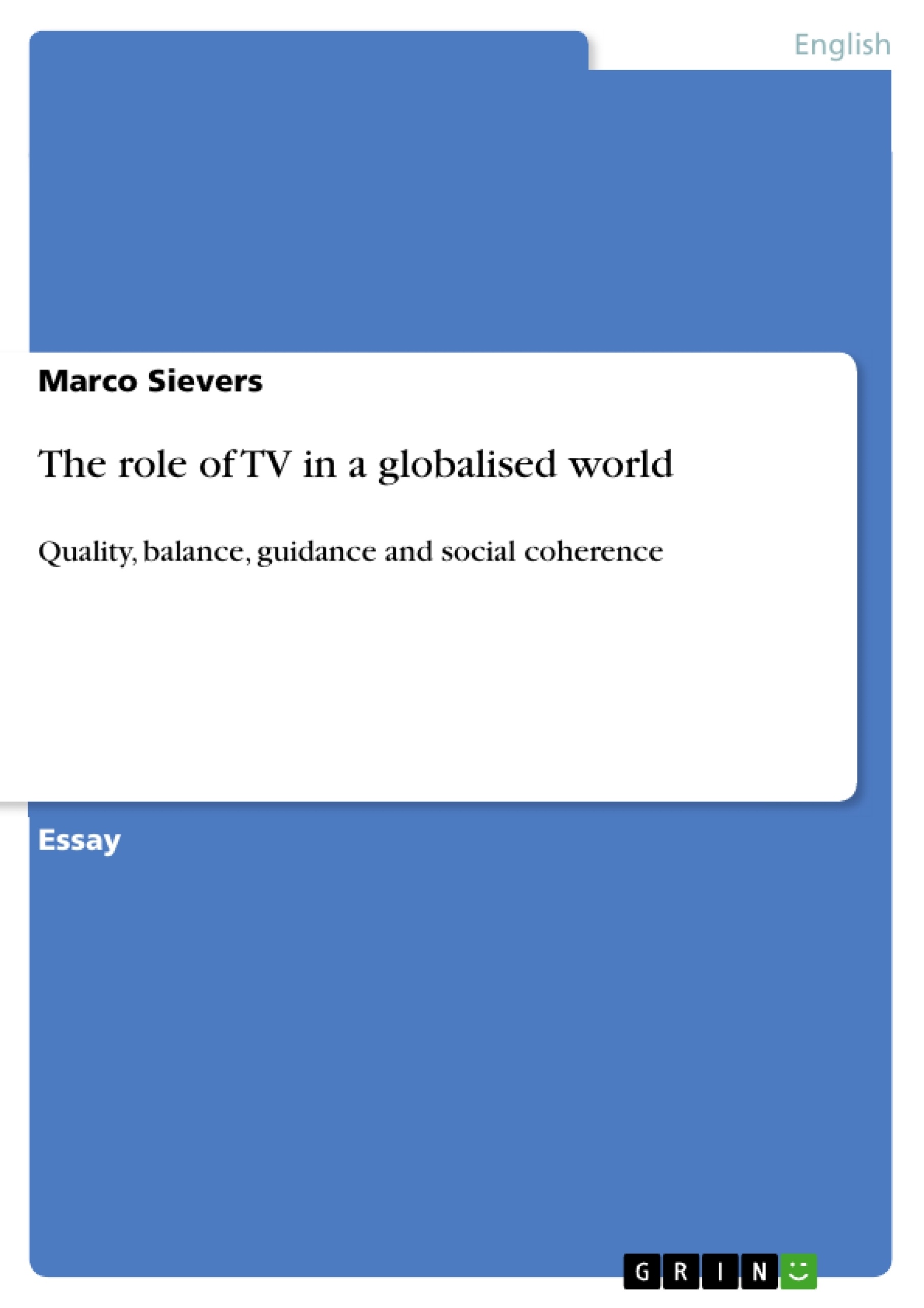Since the invention of television its role in society has been subject of continuous and controversial debates revolving about tasks, duties and responsibilities. The classical controversies focussed on the relationship between the state as a TV provider and its citizens, trying to weigh public interests up against individual liberties. Most of the time, they were limited to a national level and included elements of class struggle (cf. Corner 2001, 261, 263 et seq.)
Manifold changes in the TV landscape altered the face of programming and had effects on the role of TV. They turned the political struggle for television into a battle for market shares with an increasing international orientation. The liberalisation of television in association with the development of new broadcasting technologies led to a multitude of competing TV stations and to a diversity of available programmes. Private broadcasters’ dependence on funding by adverts caused a commercialisation of TV and shifted the focus of programming to ratings, which have become an all-dominant factor. The constant search for new ways of attracting viewers’ attention favours sensational topics and resulted in a variety of new programme formats (cf. Corner 2001, 266 and Wedell & Luckham 2002, 119). Globalisation has aggravated competition by flooding national markets with international products, and by supranational media conglomerates trying to peruse their interests in short-term profit-raising. Finally, adding to the tense atmosphere, the internet challenges TV’s role as a mass medium with its global scope and its nearly unlimited supply of entertainment, information and interactivity.
Therefore, a modern definition of the role of television has to comprise a re-evaluation of classic issues, a consideration of technological change and globalisation, and an international perspective. Even if TV seems to lose ground as the leading mass medium, it is still of great significance as a “central ingredient of everyday life” and as an “indispensable factor in the organisation of polity, society and culture” (Corner, 2001, 261). On the backdrop of growing commercialisation and superficiality a recollection of tasks and duties is necessary. Executives have to be reminded that broadcasting is not solely a business, but also an enterprise connected to responsibilities and to accountability. Existing excrescences have to be curtailed by a focus on quality, balance and guidance. Additionally, TV’s significance for the establishment and maintenance of social coherence should be recognized and emphasized.
Table of Contents
- The role of TV in a globalised world – Quality, balance, guidance and social coherence
- Quality
- Information
- Entertainment
- Balance
- Content
- Representation of social groups
- Private and public service TV
- Guidance
Objectives and Key Themes
This paper explores the role of television in a globalized world, considering its historical evolution, the impact of technological change, and the challenges posed by globalization. It argues that television remains a vital and central force in society, but it requires a reassessment of its responsibilities in light of these changes. The paper highlights the importance of upholding quality, balance, and guidance in television programming to ensure its ongoing relevance and social coherence.
- The evolving role of television in a globalized world
- The importance of quality, balance, and guidance in television programming
- The need for a re-evaluation of television's responsibilities in a rapidly changing media landscape
- The significance of television for social coherence and political discourse
- The impact of globalization on the television industry and its programming.
Chapter Summaries
- The paper begins by outlining the historical evolution of television and its changing role in society, highlighting the impact of globalization and new technologies on the television landscape. It argues that while television remains a significant force, it requires a re-evaluation of its responsibilities in a globalized world.
- The first chapter focuses on the importance of quality in television programming, particularly with regard to news and reporting. It stresses the need for accurate, truthful, and unbiased coverage of political and social issues, arguing that television coverage can have a significant impact on public opinion.
- The second chapter examines the concept of balance in television programming, considering both the content and the representation of social groups. It advocates for a diverse range of programming that caters to different needs and interests, and for a balanced representation of social groups, including minorities, to ensure inclusion and prevent marginalization.
- The third chapter addresses the issue of guidance in television programming, arguing that it plays a crucial role in a globalized information society where viewers face an overwhelming array of choices. The paper emphasizes the need for pre-selection of content based on quality, relevance, and importance, as well as the protection of minors from harmful content.
Keywords
This work explores the multifaceted role of television in a globalized world, emphasizing its historical evolution, impact of globalization, and the need for quality, balance, and guidance in programming. The text examines the significance of television for social coherence, political discourse, and the formation of public opinion. It delves into the complexities of the television industry, including the relationship between public service and private television, the influence of media conglomerates, and the challenges of representing diverse social groups. Ultimately, the paper argues for a re-evaluation of television's responsibilities in the digital age, recognizing its enduring power and its potential to shape cultural understanding and civic engagement.
- Quote paper
- Dipl.Jurist Marco Sievers (Author), 2006, The role of TV in a globalised world , Munich, GRIN Verlag, https://www.grin.com/document/77469



